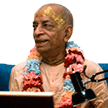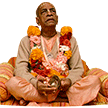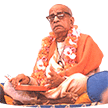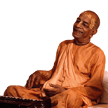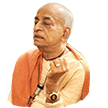Free from Reaction - an essential subject: Difference between revisions
(Created page with "Category:Essential Subjects <!----------------------- edit below this line -----------------------> <!------------------------ begin introduction text below --------------...") |
(Vanibot #0041: Moves Choose Another box to the end) |
||
| Line 2: | Line 2: | ||
<!----------------------- edit below this line -----------------------> | <!----------------------- edit below this line -----------------------> | ||
<!------------------------ begin introduction text below ------------------------> | <!------------------------ begin introduction text below ------------------------> | ||
A Kṛṣṇa conscious person acts out of pure love for the Supreme Personality of Godhead, and therefore he has no attraction for the results of the action. He is not even attached to his personal maintenance, for everything is left to Kṛṣṇa. Nor is he anxious to secure things, nor to protect things already in his possession. He does his duty to the best of his ability and leaves everything to Kṛṣṇa. Such an unattached person is always free from the resultant reactions of good and bad; it is as though he were not doing anything. This is the sign of akarma, or actions without fruitive reactions. In other words, those who are actually engaged in the devotional service of the Supreme Lord are already freed from all reactions. | |||
Srila Prabhupada's books, lectures, conversations and letters offer a comprehensive presentation of this essential subject as seen in the Vaniquotes '''[[Vaniquotes:Category: | Srila Prabhupada's books, lectures, conversations and letters offer a comprehensive presentation of this essential subject as seen in the Vaniquotes '''[[Vaniquotes:Category:Free from Reaction|Free from Reaction]]''' category. An introduction from his books is given below in the following 8 quotes. | ||
<!-------- end introduction text and don't touch next three lines ---------> | <!-------- end introduction text and don't touch next three lines ---------> | ||
== Quotes from Srila Prabhupada's books == | == Quotes from Srila Prabhupada's books == | ||
<!----------------- edit quote boxes below this line -----------------> | <!----------------- edit quote boxes below this line -----------------> | ||
{{VaniQuotebox| | {{VaniQuotebox|A devotee is free from the reactions of his karma because he has taken to devotional service|Śrīla Viśvanātha Cakravartī Ṭhākura says in this connection that one who has developed Kṛṣṇa consciousness and who exists in love with Kṛṣṇa is no longer subject to suffering and happiness under the laws of karma. Indeed, he is beyond karma. The Brahma-saṁhitā says, karmāṇi nirdahati kintu ca bhakti-bhājām: (Bs. 5.54) a devotee is free from the reactions of his karma because he has taken to devotional service. '''(Śrīmad-Bhāgavatam 6.17.17)'''}} | ||
{{VaniQuotebox| | {{VaniQuotebox|A devotee who is not perfectly freed from the resultant actions should therefore continue to act in Krsna consciousness seriously, even though there may be so many impediments|If one has finished his material activities then there is no more birth. This is possible only when one begins Kṛṣṇa conscious activities, because such activities do not produce reaction. Therefore, as soon as one becomes perfect in Kṛṣṇa conscious activities, he is not going to take birth again in this material world. A devotee who is not perfectly freed from the resultant actions should therefore continue to act in Kṛṣṇa consciousness seriously, even though there may be so many impediments. '''(Nectar of Devotion 10)'''}} | ||
{{VaniQuotebox| | {{VaniQuotebox|A sannyasi is supposed to be free from the reactions of his past activities, but a person who is in Krsna consciousness automatically attains this perfection without even accepting the so-called order of renunciation|A sannyāsī is supposed to be free from the reactions of his past activities, but a person who is in Kṛṣṇa consciousness automatically attains this perfection without even accepting the so-called order of renunciation. This state of mind is called yogārūḍha, or the perfectional stage of yoga. As confirmed in the Third Chapter, yas tv ātma-ratir eva syāt: one who is satisfied in himself has no fear of any kind of reaction from his activity. '''(Bhagavad-gītā 18.49)'''}} | ||
{{VaniQuotebox| | {{VaniQuotebox|Activities in devotional service to the Lord can give release from the reaction of faulty activities|A conditioned soul under the spell of material nature cannot understand that any action he performs for sense gratification is faulty and that only his activities in devotional service to the Lord can give him release from the reaction of faulty activities. Because he does not cease such faulty activities, he has to change to different bodies, some high and some low. That is called saṁsāra-padavīm, which means this material world, from which there is no release. '''(Śrīmad-Bhāgavatam 3.27.3)'''}} | ||
{{VaniQuotebox| | {{VaniQuotebox|Although ritualistic atonement may free one from sinful reactions, it does not awaken devotional service, unlike the chanting of the Lord's names, which reminds one of the Lord's fame, qualities, attributes, pastimes and paraphernalia|By following the Vedic ritualistic ceremonies or undergoing atonement, sinful men do not become as purified as by chanting once the holy name of Lord Hari. Although ritualistic atonement may free one from sinful reactions, it does not awaken devotional service, unlike the chanting of the Lord's names, which reminds one of the Lord's fame, qualities, attributes, pastimes and paraphernalia. '''(Śrīmad-Bhāgavatam 6.2.11)'''}} | ||
{{VaniQuotebox| | {{VaniQuotebox|As soon as the living entity becomes aloof from the activities of the body, he becomes free from the reactions as well|The temporary body or material dwelling place which he obtains is the cause of varieties of activities and their resultant reactions. Living in such a conditional atmosphere, one suffers the results of the activities of the body by identifying himself (in ignorance) with the body. It is ignorance acquired from time immemorial that is the cause of bodily suffering and distress. As soon as the living entity becomes aloof from the activities of the body, he becomes free from the reactions as well. '''(Bhagavad-gītā 5.14)'''}} | ||
{{VaniQuotebox| | {{VaniQuotebox|By performing Vedic ritualistic activities, by giving money in charity and by undergoing austerity, one can temporarily become free from the reactions of sinful activities, but at the next moment he must again become engaged|By performing Vedic ritualistic activities, by giving money in charity and by undergoing austerity, one can temporarily become free from the reactions of sinful activities, but at the next moment he must again become engaged in sinful activities. For example, a person suffering from venereal disease on account of excessive indulgence in sex life has to undergo some severe pain in medical treatment, and he is then cured for the time being. '''(Nectar of Devotion 1)'''}} | ||
{{VaniQuotebox| | {{VaniQuotebox|Chanting the holy name of the Lord even once not only frees one immediately from the reactions of the greatest sins, but also raises one to the platform of rendering loving service to the Supreme Personality of Godhead|There are twenty types of religious scriptures called dharma-śāstras, beginning with the Manu-saṁhitā and parāśara-saṁhitā, but herein it is stressed that although one may become free from the reactions of the most sinful activities by following the religious principles of these scriptures, this cannot promote a sinful man to the stage of loving service to the Lord. On the other hand, chanting the holy name of the Lord even once not only frees one immediately from the reactions of the greatest sins, but also raises one to the platform of rendering loving service to the Supreme Personality of Godhead. '''(Śrīmad-Bhāgavatam 6.2.11)'''}} | ||
<!----------------- edit quote boxes above this line -----------------> | <!----------------- edit quote boxes above this line -----------------> | ||
''' | '''Free from Reaction - [[Vaniquotes:Category:Free from Reaction|explore more within this category]]'''. | ||
{{EsentialSubjectTotal}} | {{EsentialSubjectTotal}} | ||
<div style="float:left;"> | |||
{{EssentialSubjectnav}} | |||
</div> | |||
__NOTOC__ | __NOTOC__ | ||
__NOEDITSECTION__ | __NOEDITSECTION__ | ||
Latest revision as of 16:24, 22 November 2020
A Kṛṣṇa conscious person acts out of pure love for the Supreme Personality of Godhead, and therefore he has no attraction for the results of the action. He is not even attached to his personal maintenance, for everything is left to Kṛṣṇa. Nor is he anxious to secure things, nor to protect things already in his possession. He does his duty to the best of his ability and leaves everything to Kṛṣṇa. Such an unattached person is always free from the resultant reactions of good and bad; it is as though he were not doing anything. This is the sign of akarma, or actions without fruitive reactions. In other words, those who are actually engaged in the devotional service of the Supreme Lord are already freed from all reactions.
Srila Prabhupada's books, lectures, conversations and letters offer a comprehensive presentation of this essential subject as seen in the Vaniquotes Free from Reaction category. An introduction from his books is given below in the following 8 quotes.
Quotes from Srila Prabhupada's books
Free from Reaction - explore more within this category.
Vanipedia has now over 903 introductory articles compiled from Srila Prabhupada's books under the series titled Essential Subjects. All these articles can be seen in the Table of Content on the right side of this article and also here in this Umbrella Category. Browse through them to relish the breadth and depth of Srila Prabhupada's teachings - There is a subject for everyone.
